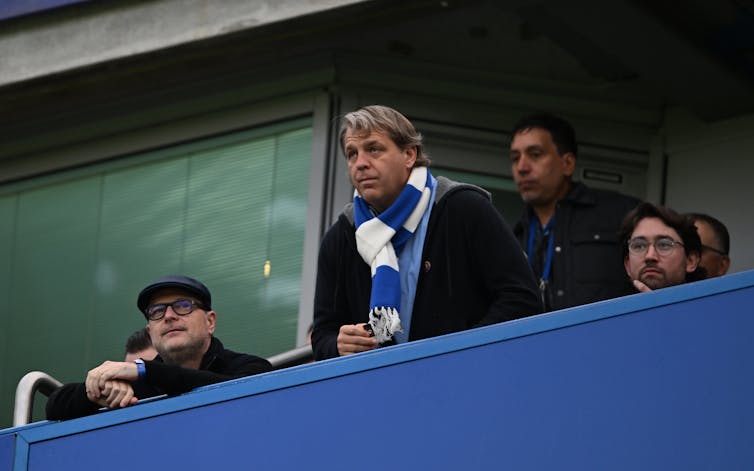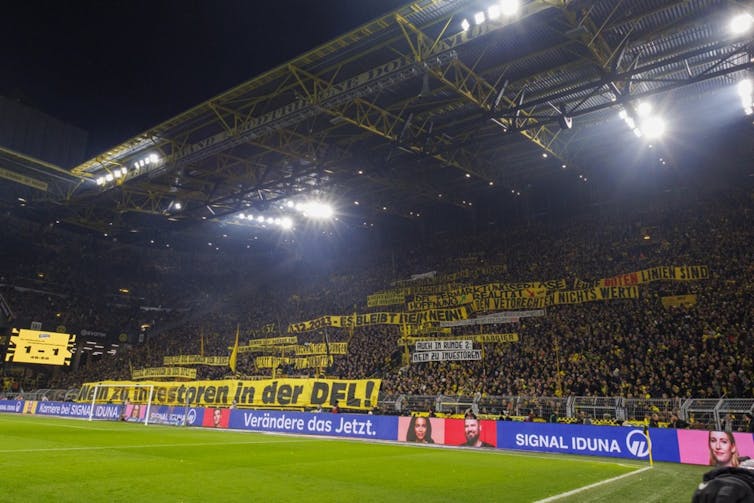Internazionale Milano (Inter Milan) were crowned champions of this year’s Serie A, the top flight of Italian football, on April 22. A month later, they were back in the news having been taken over by US investment firm Oaktree Capital Management.
This is not the first nor is it likely to be the last we see of US investment in European club football. Inter became the seventh Serie A club under American ownership, while US investors now own nine of the English Premier League’s 20 clubs. What is driving this interest? And will it last?
There are many reasons why US investors have been flocking to European football in recent years, but the one main driver is money. This has come in many forms. For example, the acquisition of Inter happened because Oaktree “assumed ownership” after the club’s Chinese owners, Suning, missed the deadline to repay the €395 million (£336.5 million) that Oaktree had loaned them in 2021.
But most of the US investments we have seen in European football over recent years have been direct investments into shares (buying part or all of a club) rather than getting it in place of an expected cash repayment. These have, among others, included the purchases of Chelsea in England, Atletico Madrid in Spain, AC Milan in Italy, and Wrexham in Wales.
Read more: How Wrexham's football fairy tale is fuelled by Disney and Hollywood glamour
The growing value of elite football clubs has led to increased interest from some American investors thinking they can buy now, hold for a few years, and resell the club for a profit. The sale of Chelsea in particular highlights the capital growth that European football clubs have undergone.
In 2003, Chelsea was bought for £140 million (£247 million in today’s money), a relative drop in the ocean compared to the £4.25 billion American businessman Todd Boehly and his Clearlake Capital consortium parted with to buy the club in 2022. The sale included £2.5 billion for the initial purchase and a further £1.75 billion of investment “for the benefit of the club”.

There are cautionary tales too. American investors have been at Manchester United, Liverpool, Arsenal and Tottenham Hotspur for years, and all of these teams made a financial loss in the 2022–2023 season.
This is not particularly surprising. European football is not a very profitable business. While the Premier League generates more revenue than any other football league in the world, the financial state of its teams is generally poor. Football clubs tend to be reliant on cash injected by their owners to run.
However, this financial landscape also shows that money can be made in football if costs are controlled. And it is this opportunity to cut costs that is a major draw for US investors.
Many American investors come to European football having already made investments in other sports. Boehly, for example, is also an owner of a number of American baseball and basketball sides. This allows investors like Boehly to share resources from crossover investments – including marketing, contacts and ideas – which should lower some costs for each club or franchise.
The problem here is European clubs need to keep up spending alongside their competition to avoid the risk of falling down the leagues. This is very different to the competitive background of US sports, where closed leagues (no promotion or relegation) decrease the risk attached to having a bad season.
Fan power
The other problem with trying to optimise efficiency is that it often equates to cost-cutting and trying to find new commercial opportunities. This can sometimes clash with the views of fans, who have a lot more power in Europe than they do in the US.
There are many commercial opportunities to be found in European football, including increasing the variety and availability of merchandise. But European sports culture is much less commercial than in the US and many fans can be put off by the commodification of their sport.
This can impact match day ticket sales directly, while also affecting sponsorship and broadcasting income. Sponsors try to avoid controversy that can be bad for their own sales, and broadcasters prefer full stadiums and atmosphere as it is good for their “product”.
For example, protests by fans of German clubs in February forced the German Football League to abandon plans to sell a stake in its media rights business to a private equity firm. As protests intensified, one of the two leading candidates for the investment contract, US private equity firm Blackstone, withdrew from the process citing uncertainty and an unstable environment.

American investors that are looking to buy European clubs are also discovering that there are bargains to be found. Since the turn of the century, a number of European clubs have gone into administration, including Serie A’s Fiorentina in 2002, Portsmouth (then in the Premier League) in 2010, and French side Bordeaux in 2021. This means some clubs can be picked up at relatively low prices compared to their counterparts in the US.
This difference in value is particularly stark in women’s football. The latest National Women’s Soccer League franchise in the US, San Diego Wave, sold for US$120 million in March. By contrast, one of the most illustrious clubs in women’s football, Olympique Lyonnais Féminin, was valued at just US$5.1 million in 2023.
There is the potential to make money in European football, although many have failed. Football is a resilient industry that, if run well, can be relatively immune to changes in the economy. And this, more than anything, is what continues to make investment in European football a very alluring prospect indeed.

